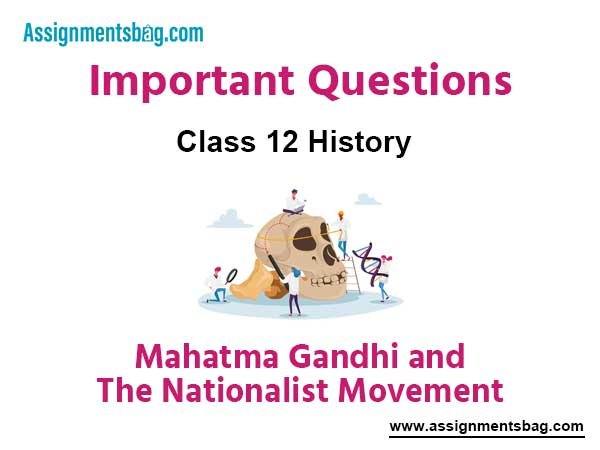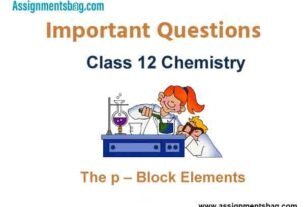Please refer to Mahatma Gandhi and The Nationalist Movement Class 12 History Important Questions with solutions provided below. These questions and answers have been provided for Class 12 History based on the latest syllabus and examination guidelines issued by CBSE, NCERT, and KVS. Students should learn these problem solutions as it will help them to gain more marks in examinations. We have provided Important Questions for Class 12 History for all chapters in your book. These Board exam questions have been designed by expert teachers of Standard 12.
Class 12 History Important Questions Mahatma Gandhi and The Nationalist Movement
Very Short Answer Questions :
Question. Who were the ‘Moderates?
Ans. Who preferred a more gradual and persuasive approach like Firoj Shah Mehta, Gopal Krishan Gokhale.
Question. Why did Gandhiji Start Non Cooperation Movement?
Ans. To get Swaraj
Question. Who are known as Lal, Bal, and Pal?
Ans. Lal – Lala Lajpat Rai (Punjab)
Bal – Bal Gangadhar Tilak (Maharashtra)
Pal – Bipin Chandra Pal (Bengal)
Question. What was Gandhi – Irwin Pact of 1931?
Ans. 1.Gandhiji Postponed Civil Disobedience Movement.
2. Irwin agreed to release all prisoners.
3. Gandhiji went to – second round table conference.
Question. What is the importance of Dandi March?
Ans. Civil law violated across large part of India.
Question. What is the sources to know the role of Mahatma Gandhi in the history of National Movement of India.
Ans. Auto-biographies and biographies.
– Contemporary newspapers.
Question. Why Mahatma Gandhi has been regarded as the ‘Father’ of Indian Nation.
Ans. Because in the history of nationalism a single Man is often identified with the making of a Nation. Example – Garibaldi-(Italy) Washington with America; Ho Chi Minh with Vietnam.
Short Answer Questions :
Question. Explain the significance of Dandi March?
Ans. 1. Violation of Salt law- a monopoly of British and manufacturing of salt.
2. Large scale participation of women.
3. Civil law violated across large part of India.
Question. Give the significance of the Salt March.
Ans. 1.This event brought Mahatma Gandhi to world attention.
2. First nationalist movement in which women participated.
3. Create pressure upon British Government
Question. What was the problem of separate electorates? What were the disagreements between Congress and Dalits on this issue? Finally what solution could be of this issue?
Ans. Demand of separate electorates by the Dalits in which they wanted reservation in separate electorates like Muslims. In 1931 in the second Round Table Conference dalit leader Dr. B. R. Ambedkar said Congress does not represent the Dalits.
– He said Dalits are socially and economically backward. By separate electorate they can put demands of their rights.
– Gandhiji opposed the separate electorates.
– Finally Congress gave separate electorates to Dalits within the Congress.
Long Answer Questions :
Question. Explain the sources from which we can reconstruct the political career of Mahatma Gandhi and the history of National Movement of India.
Ans. Auto-biographies and biographies.
– Contemporary newspapers.
– Official and police records.
– Public speeches
– Private letters.
Question. “Where ever Gandhiji went, rumours spread of his miraculous power.” Explain with examples.
Ans. 1. The ascetic life style,
2. Use of dhoti and charkha
3. Use of Hindi for communication made Gandhiji very popular.
4. Where ever he went rumours spread of his miraculous powers.
a) Sent by King to redress the grievances of the farmers.
b) Had power to overrule all local officials.
c) Gandhiji was superior to the British.
5. Fight against untouchability.



